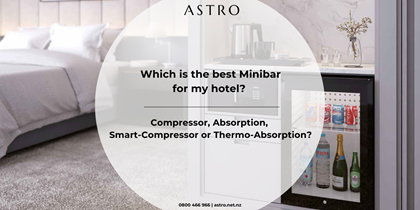Sabrina is a seasoned digital marketing manager with 10+ years of B2B & B2C experience in the tech and SaaS space. She is focused on building and implementing strategies that innovate, create awareness, and generate demand. Sabrina executes brand/product development through strategic alignment, passion, resolute focus, and inspired teams.
How do I know if my minibar has ammonia or not?

It’s a known fact that ammonia possesses the right properties to achieve optimum cooling in refrigerators. Although using ammonia as a refrigerant is not as common as it once was thanks to new eco-friendly and non-ammonia alternatives, it can still be found in some hotel guest room minibars.
While it’s every manufacturer's intention to create a well-designed system that operates safely, unpredictable gas leaks, however, can’t be entirely prevented. In case you didn’t know, ammonia is a strong colourless gas that can be hazardous to your guests’ health. It might not be life-threatening but exposure to the substance or inhalation of high concentrations can result in your guests getting severe burns to their throat, lungs, eyes and skin. When it leaks, your hotel then has to be evacuated and the emergency services will need to come to the site to ensure the leak is dealt with safely.
As minibar engineering progresses many hotels are moving away from the standard compressor fridges, which have loud motors, to models that are equipped with the latest silent smart technologies. As a hotelier, you may have already heard about the smart-tech minibars that utilize non-ammonia, non-toxic refrigerant components or have a built-in control panel to manage how often the compressor runs. The purpose of these new-generation mechanics is to ensure your guests enjoy a quiet stay thanks to the silent fridge and to eliminate the potential risks of an ammonia leak.
With so many different makes and models available for your hotel, a question we often get asked is, “How do I know if my minibar has ammonia or not?” Let’s break this down…
- Does Have Ammonia:
If your minibar fridge is ‘Heat-Absorption’ (or commonly referred to as Absorption) it will contain ammonia as the refrigerant. This is an older technology that is still widely used by manufacturers because it makes the minibar 100% silent, and cost-effective. - Does Not Have Ammonia:
When the minibar doesn’t have a compressor the manufacturer needs to use a different refrigerant. As an example, a ‘Thermo-Absorption’ minibar uses a non-ammonia and non-toxic refrigerant known as R600A. R600A not only delivers great thermodynamic performance it is also very sustainable because it has no ozone depletion potential, boasts low power consumption and load power compared to earlier refrigerants… and if the fridge does leak it isn’t harmful to your guests or team.
Another option is a ‘Smart Compressor’ which is a new development. This minibar is programmed by the factory to run between 9am-12pm when the guest is likely up and getting ready to check out. Then the next 3-hour slot is between 5pm – 8pm, while the guest is likely out of the room having dinner.
Overall, there are advantages to each model and it really depends on what is important to you and your guests. Before you start on your buying journey or make the switch we strongly recommend having a conversation with your supplier to ask them about the technology their minibars use.
If you want to learn more about the advantages and disadvantages between the smart technologies: Compressor vs. Smart Compressor vs. Heat Absorption vs. Thermo Absorption check out our recent article.

